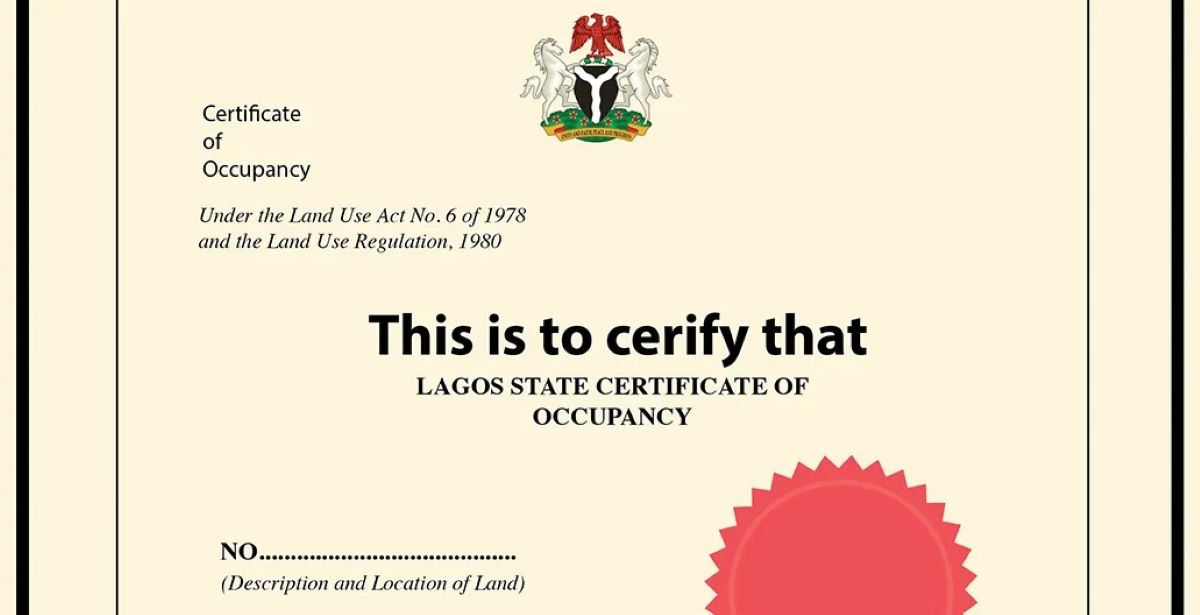Everything You Need to Know About the Certificate of Occupancy
Have you ever wondered what makes a property—whether land, a house, or real estate—truly yours?
In the world of real estate, a Certificate of Occupancy (C of O) is a crucial document that establishes ownership and ensures that a property is safe and suitable for habitation.
This certificate, though a piece of paper, represents your rights as a property owner. It provides legal proof that your property meets all necessary building codes and regulations.
If you’re looking to buy or sell real estate, it is very important for you to understand the significance of the Certificate of Occupancy. In this article, you’ll learn everything you need to know about this very important document.
What is a Certificate of Occupancy?
A Certificate of Occupancy, popularly known as C of O, is an official document issued by local government authorities or building departments. It certifies that a building or structure complies with all applicable building codes, zoning laws, and safety standards. The government is required by the constitution to issue the Certificate of Occupancy, as all land within the state is owned by the Governor, as clearly outlined in the Land Use Act of 1978.
Also, this document confirms that the property is fit for occupancy and can be legally inhabited. It contains vital information such as the property’s address, the owner’s name, its intended use, whether residential, commercial, etc. It also contains a verification that the property meets local regulations.
READ ALSO: Plots, Acres & Hectares: A Simple Guide to Understanding Land Measurements in Nigeria
Why is the Certificate of Occupancy Crucial?
In Nigeria, the Certificate of Occupancy is perceived as an important document of land ownership. Some of the reasons why this is so are:
1. Proof of Ownership
The C of O serves as legal evidence that you own the property. Without it, you may face challenges in asserting your rights over the land.
2. Legal Protection
When you have a Certificate of Occupancy, you are protected from potential government seizure of your property. If you lack this document, authorities can claim ownership without any form of compensation.
3. Increased Property Value
Properties with a valid C of O typically have higher market values compared to those without one. Buyers are often more inclined to invest in properties that are legally recognized and compliant with regulations.
4. Facilitates Transactions
A C of O is often required when selling or mortgaging a property. It helps streamline transactions by providing assurance to buyers and lenders that the property is both legitimate and safe.
5. Assurance of Safety
The process of obtaining a Certificate of Occupancy involves inspections to ensure that the building adheres to safety standards. This means that properties with a C of O are generally safer for occupants.
Application Process for Obtaining a Certificate of Occupancy
The process for obtaining a Certificate of Occupancy (C of O) can vary depending on your location and local regulations. Generally, it involves the following key steps:
1. Submission of Application
Property owners must submit an application to their local government or building department, along with any required documents such as architectural plans and proof of ownership.
In Nigeria, documents such as a formal letter addressed to the executive secretary, evidence of income tax payment, a current development levy, a survey plan, a standard allocation form with receipt, four passport photographs with a white background, all payment receipts of land charges, and a vital information form are required for application.
2. Inspection
After submitting the application, officials will conduct inspections to ensure that the building complies with zoning laws, safety codes, and other regulations.
3. Approval
If the property passes all inspections and meets the necessary criteria, the Certificate of Occupancy will be issued.
4. Renewal (if applicable)
In some regions (outside Nigeria), the jurisdictions may require periodic renewals or re-inspections to maintain compliance. In Nigeria, the Certificate of Occupancy generally does not have an expiration date; however, it may need to be periodically updated or endorsed under specific circumstances. For instance, when a property is sold, the new owner must either acquire a new Certificate of Occupancy or update the existing one to indicate the change in ownership.
Conclusion
Whether you’re buying, selling, or developing real estate, the Certificate of Occupancy is a must-have document for you if you are particular about a safe investment in real estate. Always ensure that every property you acquire or sell has a valid Certificate of Occupancy. This will help safeguard your investment and give you the full right of ownership over the property.
If you enjoyed this content, stick to Realty Explainer for more real estate-related information.

